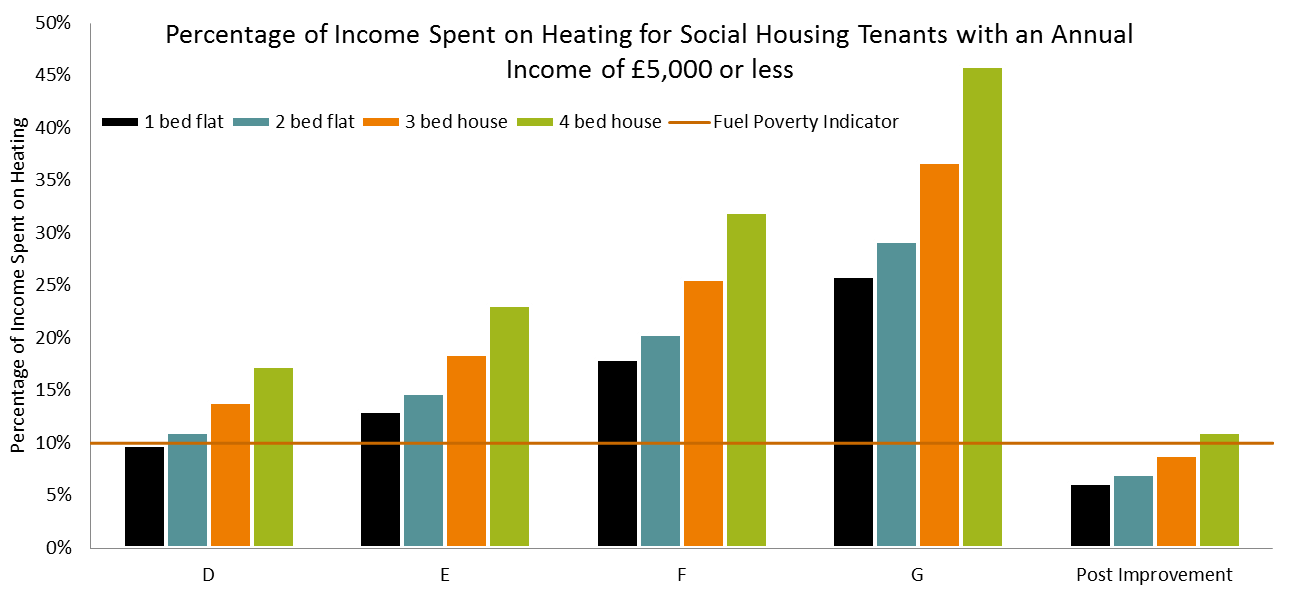As part of our policy development and engagement, we hosted a social housing and local authority roundtable focused on the installation of energy efficiency measures and low carbon heating on Tuesday 22nd November.
The majority of social housing properties were built between 1945 and 1980 and although the energy performance (EPC) rating of social housing is higher than private and owner occupier tenure properties, there is still a significant proportion in need of retrofitting. The SEA presented some analysis on the impact of having a low EPC on the risk of being classified as fuel poor. The graph below demonstrates that increasing the EPC rating to band C reduces the risk of a household being in fuel poverty as it reduces the proportion of income spent on heating. Similar graphs showed that better EPC ratings correlate with reduced rent arrears, fewer void days and lower maintenance costs.

It would seem then that putting energy efficiency measures in social housing is a no brainer; residents are warmer, they are better off and landlords’ income is more secure. At the moment however social housing retrofits are few and far between so the aim of the round table was to bring together housing providers and our members, including technology manufacturers, to better understand the challenges faced by the social housing sector and to discuss potential solutions to encourage the deployment of these measures.
The presentations by Felicity Tolley from Delta-EE and Andrea Griffiths-James of Nottingham Community Housing Association were extremely interesting and packed with valuable insight into the implementation (or lack thereof) of efficiency measures in social housing at a national and local level respectively. The subsequent discussion saw technical, financial and social barriers to deployment raised accompanied by many solutions linked to better communication and education. There was also a clear consensus that the ramping up of standards is needed to ensure that measures are installed and that social housing providers, manufactures and suppliers are collectively incentivised to take action.
Firstly, it is crucial that Registered Social Landlords (RSLs) or energy officers within housing associations clearly communicate the benefits and educate shareholders on the additional value to their assets that can be gained through carrying out energy efficiency improvements as ultimately it is their bottom line that is boosted by spending money on energy efficiency measures. By improving communication and better educating the decision makers within housing associations, the inertia in decision making within housing associations, which was highlighted by attendees as a barrier to deployment, should be a thing of the past.
A recurring theme throughout the discussion was that RSLs struggle to navigate the existing sources of funding and information. There is a desire from social housing providers to gain a greater knowledge of energy efficiency and low carbon heat measures. The financial return of installing insulation is well understood by RSLs but with increasing technological improvements and innovations, they often find it difficult to keep up with the marketplace. So it is our responsibility as individual manufacturers and suppliers and collectively as a trade association to make RSLs aware of the array of available options to reduce energy consumption and decarbonise heat. It was proposed that having a central funding hub would make it easier for social housing providers to assess available funding streams.
Finally, the tenants themselves must be taught how to use their heating systems correctly in order to maximise the benefit. Attendees recounted situations where occupants were unable to operate their heating system effectively as the controls were unfamiliar or the system was used incorrectly because of poor instructions or guidance. A concerted effort must therefore be made to teach residents how to keep their home warm and healthy as cheaply and sustainably as possible.
If you would like more information on future events or greater detail on what was discussed please contact:
Samantha Crichton
Tel: +44 (0)121 709 7740
Mob: +44 (0)7584 237543